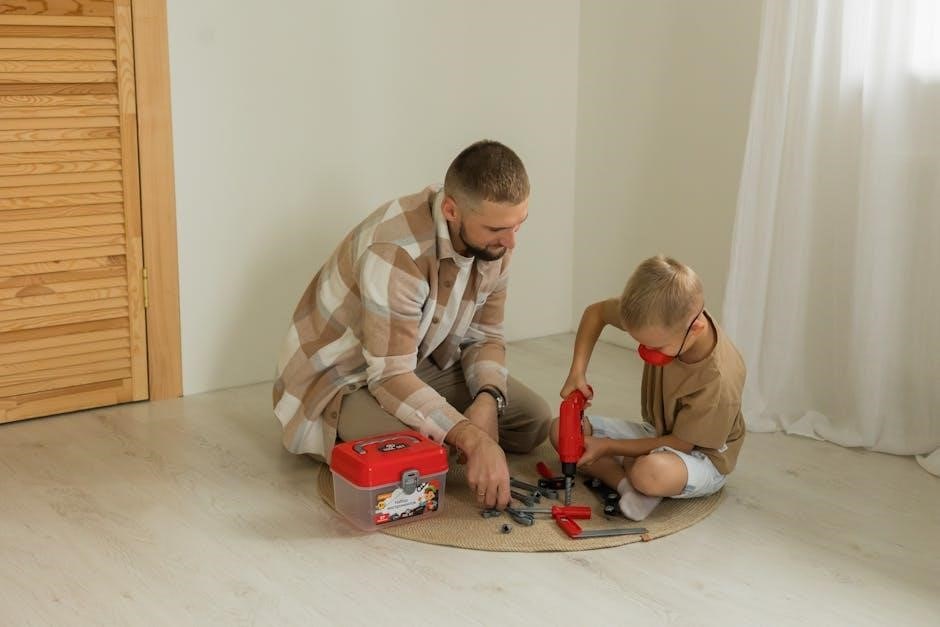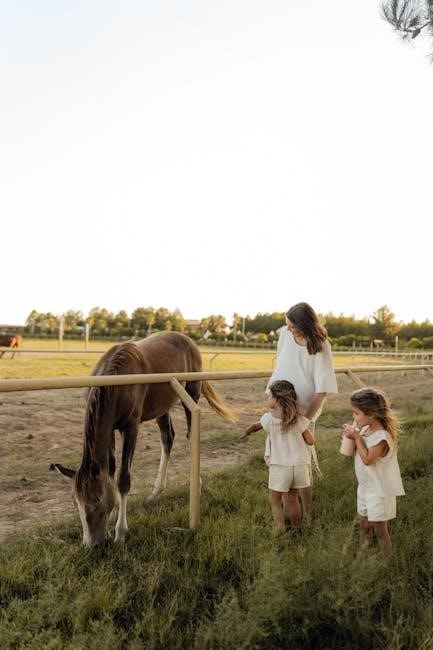Welcome to The Ranch Parents Guide, your resource for navigating the series’ themes, humor, and mature content. This guide helps parents make informed decisions about their children’s viewing experience, ensuring age-appropriateness and fostering meaningful conversations about the show’s complex topics.
Understanding the Purpose of the Guide
This guide serves as a valuable resource for parents seeking to understand and navigate the complexities of The Ranch. Its purpose is to provide insights into the series’ themes, content, and character dynamics, helping parents make informed decisions about their children’s viewing experience. By addressing age-appropriateness, mature themes, and moral lessons, the guide equips parents with the tools to foster meaningful conversations and ensure their children engage with the show responsibly. It also highlights the importance of balancing humor with serious topics, offering a comprehensive toolkit for mindful parenting in the digital age.
Why Parents Need to Be Aware of The Ranch
Parents must be aware of The Ranch due to its blend of humor and mature themes, which may impact young viewers. The series tackles complex issues like relationships, substance use, and family conflicts, requiring parental guidance. Understanding the show’s content helps parents decide if it’s suitable for their children and how to address its themes. This awareness allows parents to prevent potential negative influences and encourage positive lessons, fostering a safer and more informed viewing experience for their kids while promoting open discussions about the series’ messages and moral implications.

Overview of The Ranch Series
The Ranch follows the Bennett family on their Colorado ranch, blending humor with heartfelt moments. The series explores family dynamics, love, and personal growth in a rural setting.
The Ranch Series: A Brief Summary
The Ranch is a heartwarming yet edgy comedy-drama series centered around the Bennett family on their Colorado ranch. The show explores the lives of Rooster, Beau, and their sons, Colt and Rooster, as they navigate love, family conflicts, and personal growth. With its blend of humor and emotional depth, the series tackles themes like forgiveness, loyalty, and redemption. The ranch setting provides a unique backdrop for exploring rural life and the challenges of maintaining family traditions. The series balances lighthearted moments with serious topics, offering a relatable and engaging story for audiences.
Key Themes and Messages in The Ranch
The Ranch explores themes of family, forgiveness, and personal growth, set against the backdrop of rural life. The series delves into the complexities of sibling relationships, parental guidance, and the challenges of maintaining family traditions. It emphasizes the importance of loyalty, redemption, and second chances, often blending humor with heartfelt moments. The show also highlights the struggles of rural living and the resilience required to overcome life’s obstacles. These themes provide a rich foundation for parents to discuss with their children, encouraging reflection on values, responsibilities, and the power of forgiveness in relationships.

Content Advisory for Parents
This guide provides essential insights into The Ranch’s mature themes, language, and substance use, helping parents navigate the show’s content responsibly and make informed viewing decisions for their families.
Age-Appropriateness of The Ranch
The Ranch contains mature themes, strong language, and situations involving substance use, making it unsuitable for young audiences. Parents should consider the emotional maturity of their children before allowing them to watch. The show’s humor and adult content may appeal to teenagers, but its complex topics require guidance. It is recommended for viewers aged 16 and above due to its explicit nature. Co-viewing and open discussions can help parents ensure their children understand the series’ context and themes responsibly.
Violence and Mature Themes in The Ranch
The Ranch includes scenes of violence, fistfights, and mature situations that may not be suitable for all audiences. The series tackles heavy topics like addiction, infidelity, and family conflict, which are portrayed realistically. While the violence is not overly graphic, it is frequent enough to warrant parental discretion. Mature themes, such as casual relationships and substance abuse, are also prevalent. Parents should evaluate their child’s sensitivity to such content before allowing them to watch. The show’s dramatic elements are balanced with humor but still require careful consideration for younger viewers.
Language and Profanity in The Ranch
The Ranch contains frequent use of casual language and profanity, including swear words and adult humor. The dialogue reflects the characters’ personalities and real-life conversations, often incorporating slang and colloquial expressions. While the language is not excessively graphic, it is prevalent and may not be suitable for younger or sensitive audiences. Parents should be aware of the show’s verbal content, as it includes jokes, banter, and occasional strong language that could influence impressionable viewers. The series’ humor is geared toward a mature audience, making parental discretion essential when deciding if it’s appropriate for teenagers.
Substance Use and Addiction Portrayal
The Ranch addresses substance use and addiction through several characters’ struggles, offering a realistic portrayal of alcohol abuse and its consequences. The series depicts how addiction affects relationships, decision-making, and overall well-being, often leading to regrettable actions. While the show doesn’t glorify substance use, it does present it as a coping mechanism for some characters, which may resonate with viewers facing similar challenges. Parents should be cautious, as these scenes might normalize alcohol consumption or spark curiosity in younger audiences. The series provides opportunities for conversations about the dangers of substance abuse and the importance of seeking help.

Character Analysis for Parental Guidance
The Ranch features complex characters whose behaviors and choices provide valuable lessons for parents and teens. Analyzing these characters helps guide discussions about responsibility, ethics, and growth, offering insights into real-life decision-making and the importance of positive role models. This section focuses on how these portrayals can aid parents in setting examples and fostering meaningful conversations about character development and moral values.
Rooster Bennett: Lessons for Parents
Rooster Bennett, a central character in The Ranch, offers valuable lessons for parents through his rugged, no-nonsense approach to life and family. His unwavering commitment to tradition and hard work teaches the importance of responsibility and integrity. Parents can learn from his emphasis on accountability, particularly in how he guides his sons to embrace their roles and face challenges head-on. While his methods may seem old-school, they highlight the importance of setting clear expectations and fostering resilience. This character serves as a reminder for parents to balance discipline with compassion while navigating complex family dynamics. His journey underscores the power of consistency and love in parenting.
Beau Bennett: Role Modeling for Teenagers
Beau Bennett, the older brother in The Ranch, serves as a compelling role model for teenagers, showcasing maturity, responsibility, and a strong work ethic. His decision to return to the family ranch highlights commitment to family and personal growth. Beau’s calm demeanor and thoughtful approach to conflicts demonstrate emotional intelligence and problem-solving skills. For teenagers, his character illustrates the value of hard work, loyalty, and standing by one’s principles. Parents can use Beau’s character to discuss the importance of responsibility, handling relationships, and making ethical decisions, offering a positive influence on young viewers navigating similar challenges.
Mary Conner: Moral and Ethical Dilemmas
Mary Conner, the matriarch of the Bennett family in The Ranch, often faces moral and ethical dilemmas that challenge her values and relationships. Her character explores themes of honesty, loyalty, and forgiveness, offering parents opportunities to discuss complex life situations with teenagers. Mary’s decisions, especially regarding family conflicts and personal integrity, provide insight into navigating difficult choices. Parents can use her storyline to teach teens about the importance of standing by principles, resolving conflicts with empathy, and understanding the consequences of one’s actions. Her character serves as a catalyst for meaningful conversations about morality and ethical behavior.

Family Dynamics in The Ranch
The Bennett family’s complex relationships and interactions form the core of The Ranch, exploring themes of loyalty, conflict, and unconditional love. Their bonds and disagreements reflect real-life family struggles, offering parents a relatable framework to discuss teamwork, communication, and understanding with their teenagers.
Exploring Family Relationships in The Ranch
The Ranch delves into the intricate dynamics of the Bennett family, showcasing their struggles, bonds, and growth. The series highlights how family members navigate loyalty, trust, and misunderstandings, often leading to emotional conflicts. Through comedic yet heartfelt moments, it portrays how generational differences and personal flaws shape their interactions. Parents can use these storylines to discuss with teenagers the importance of communication, forgiveness, and supporting one another despite imperfections. The show’s realistic portrayal of family life provides a relatable foundation for conversations about love, responsibility, and the challenges of maintaining strong family ties in a flawed but loving environment.
Parent-Child Conflict and Resolution
The Ranch often portrays parent-child conflicts, particularly through the Bennett family’s struggles with communication and understanding. These conflicts stem from generational gaps, differing values, and unresolved past issues. The show highlights how emotional arguments and power struggles can arise, but it also emphasizes resolution through open dialogue and mutual respect. Parents can learn how to address similar challenges by fostering honesty and empathy. The series demonstrates that conflict can lead to growth when families work together to understand each other’s perspectives and find common ground, ultimately strengthening their relationships and building trust.
Sibling Rivalry and Bonding in The Ranch
The Ranch explores sibling rivalry through the Bennett brothers, showcasing how their competitive and often tense relationships evolve into deep loyalty. The series highlights moments of jealousy, misunderstandings, and playful banter, which are common in sibling dynamics. However, it also portrays the unbreakable bond that ultimately unites them. Parents can gain insights into how siblings navigate conflicts, learn forgiveness, and develop lifelong connections. The show emphasizes the importance of communication and shared experiences in fostering resilience and unity among siblings, offering valuable lessons for families dealing with similar challenges.

Moral and Ethical Lessons
The Ranch explores moral growth, teaching characters to confront ethical dilemmas, accept responsibility, and seek redemption through genuine change and personal accountability.
Teaching Right from Wrong Through The Ranch
The Ranch offers a blend of humor and heartfelt moments that help parents teach moral values. Characters often face ethical dilemmas, providing opportunities for discussions about honesty, responsibility, and integrity. The show portrays consequences of poor choices, reinforcing the importance of accountability. While some themes are mature, they can spark conversations about empathy, loyalty, and doing what’s right. Parents can use these storylines to guide teenagers in understanding the difference between right and wrong, encouraging critical thinking about real-life situations and the impact of their decisions.
Consequences of Actions in The Ranch
The Ranch effectively illustrates how actions lead to consequences, a valuable lesson for teenagers. Characters face direct repercussions for their decisions, such as financial setbacks, strained relationships, or personal failures. These storylines provide opportunities for parents to discuss accountability and responsibility. The show often highlights how poor choices can spiral into larger problems, emphasizing the importance of thinking before acting. While the series can be humorous, its portrayal of real-world outcomes helps teens understand that their actions have lasting effects, encouraging them to make better decisions in their own lives.
Forgiveness and Redemption in The Ranch
The Ranch delves into forgiveness and redemption, offering valuable lessons for teens. Characters frequently confront past mistakes, seeking apologies and working to redeem themselves. For example, Rooster Bennett faces challenges in regaining trust after his past actions, illustrating the arduous journey of mending relationships. These narratives allow parents to discuss the significance of second chances and personal development. The series shows that redemption is a gradual process, requiring genuine effort and emotional depth. By balancing humor with heartfelt moments, The Ranch makes these complex themes relatable and opens doors for meaningful conversations between parents and teenagers about real-life forgiveness and growth.

Humor and Entertainment Value
The Ranch blends witty humor with heartfelt moments, making it entertaining for families while tackling serious themes. Its relatable comedy appeals to a broad audience.
Appropriateness of Comedy in The Ranch
The Ranch incorporates humor that is often sarcastic and witty, appealing to adult audiences. While the comedy can be entertaining, some jokes may contain adult themes or innuendos. Parents should be cautious, as the humor may not align with younger viewers’ sensitivity levels. The show balances lighthearted moments with mature content, making it essential for parents to preview episodes. This ensures they can assess whether the humor is suitable for their child’s age and understanding. The comedic elements, while engaging, should be monitored to avoid exposing children to inappropriate material.
Balancing Humor with Serious Themes
The Ranch skillfully blends comedy with heartfelt, serious moments, creating a relatable viewing experience. While the show’s humor often revolves around sarcasm and witty banter, it also tackles real-life issues like family conflicts, personal struggles, and moral dilemmas. Parents should appreciate how the series uses humor to soften heavy topics, making them more approachable for discussions. However, it’s important to ensure that younger viewers understand the gravity of the underlying themes. The balance between laughter and drama allows the show to address complex subjects in an engaging yet thoughtful manner, offering valuable lessons for both teens and adults.

Parental Control and Monitoring
Parents should actively monitor their child’s viewing habits, set boundaries, and use parental controls to ensure appropriate content consumption, fostering a safe and guided environment.
Setting Boundaries for Watching The Ranch
Parents should establish clear boundaries for watching The Ranch, ensuring it aligns with their child’s maturity level and family values. Setting time limits and restricting access to certain episodes can help control exposure to mature themes. Discussing the show’s content beforehand and watching together can provide context and spark meaningful conversations. It’s also important to consider the child’s age and sensitivity to humor, language, and emotional intensity. Creating a viewing schedule and encouraging open dialogue fosters trust and helps children understand boundaries, making the experience both enjoyable and educational.
Monitoring Conversations About The Ranch
Parents should actively monitor conversations about The Ranch to understand their child’s interpretation of the show. This involves listening to their thoughts and opinions, ensuring they grasp the intended messages. Encourage open dialogue by asking questions about their favorite characters or episodes. Pay attention to how they relate the show’s themes to real life, addressing any misunderstandings. This helps parents guide their child’s understanding, fostering critical thinking and ensuring the content aligns with family values. Active engagement in these discussions can strengthen parent-child communication and provide insights into their child’s perspective.
Using Parental Controls on Streaming Platforms
Implementing parental controls on streaming platforms is essential for managing access to The Ranch. Most platforms offer features like PIN protection, content filters, and maturity ratings. Parents can restrict access to specific shows or set viewing limits. Monitoring activity logs helps track what your child is watching. Adjusting settings to block mature themes ensures alignment with family values. Regularly updating these controls and discussing their purpose with your child fosters trust and responsibility. This proactive approach helps create a safe and appropriate viewing environment tailored to your child’s developmental stage.

Discussion Guide for Parents
This guide helps parents engage in meaningful conversations about The Ranch, exploring themes, character motivations, and life lessons. It encourages critical thinking and open dialogue.
Starting Conversations About The Ranch
Parents can begin by asking open-ended questions about the show, such as, “What do you think about Rooster’s decisions?” or “How do the characters handle conflict?” This encourages reflection and discussion. Sharing your own thoughts on the themes, like family loyalty or forgiveness, can deepen the conversation. Encourage your child to relate the show’s situations to real-life experiences, fostering a connection between entertainment and personal growth. By actively listening and guiding the dialogue, parents can help their children critically analyze the content and its relevance to their lives.
Asking Questions About Key Scenes
Engage your child by asking questions about pivotal moments in The Ranch, such as, “Why do you think Rooster made that decision?” or “How do you feel about Beau’s reaction?” These inquiries encourage critical thinking and help your child analyze the characters’ motivations. Discussing scenes where conflict arises or lessons are learned can provide insight into the show’s themes. Ask if they agree with how situations were resolved and how they might handle similar challenges. This fosters a deeper understanding of the series and its relevance to real-life decision-making.
Encouraging Critical Thinking About The Ranch
Encourage your child to think critically about The Ranch by discussing its themes and character decisions. Ask them to evaluate how the show portrays family dynamics, personal growth, and ethical dilemmas. Prompt them to consider how the characters’ choices align with their own values. Discuss how the humor balances with serious issues and whether they feel the show accurately reflects real-life challenges. This helps your child develop analytical skills and fosters a deeper understanding of the series’ intent and its relevance to their own experiences.
Impact on Teenagers
The Ranch portrays relatable teenage characters facing real-life challenges, offering insights into decision-making and personal growth. Its authentic storytelling can influence teens’ perspectives on family, loyalty, and self-improvement.
How The Ranch Influences Teen Behavior
The Ranch presents realistic portrayals of teenage life, shaping perceptions of relationships, decision-making, and personal growth. Its characters’ struggles and triumphs can foster empathy and self-reflection in young viewers. While the show’s humor and relatable themes may resonate with teens, its mature content and occasional irresponsible behavior warrant parental guidance. Teens may emulate the show’s camaraderie and loyalty but could also be influenced by its portrayal of risky choices. Parents should monitor how their teens process the series and encourage critical thinking about its messages.
Relating to Teenage Characters in The Ranch
Teenagers often find themselves drawn to the relatable struggles and experiences of the younger characters in The Ranch. Characters like Colt and Rooster navigate family dynamics, personal growth, and relationships, mirroring real-life challenges teens face. The show’s portrayal of imperfection and vulnerability can help teens feel less isolated in their own struggles. Parents can use these storylines to spark conversations about identity, responsibility, and decision-making. By connecting with these characters, teens may gain insights into handling their own conflicts and aspirations, fostering a deeper understanding of themselves and their place within their families.
Addressing Peer Pressure Through The Ranch
The Ranch provides opportunities for parents to discuss peer pressure with teenagers. Characters often face situations where poor decisions are influenced by others, such as substance use or risky behavior. These storylines can help teens recognize the dangers of conforming to societal or friend groups. Parents can use these moments to emphasize the importance of independent thinking and resisting negative influences. Encouraging teens to reflect on how characters handle peer pressure can foster critical thinking about real-life scenarios and the consequences of giving in to external pressures.

Resource and Support
Parents can access official guides, parenting blogs, and community forums for additional insights and strategies to navigate discussions about The Ranch with their teenagers effectively.
Where to Find Additional Parenting Resources
Parents seeking more guidance can explore official The Ranch fan sites, parenting blogs, and educational platforms offering analysis and discussion guides. School counselors and local libraries often provide free resources tailored for families. Online communities, such as forums and social media groups, connect parents for shared insights and advice. Additionally, websites focused on teen development and media literacy offer tools to help navigate complex themes in the series. Leveraging these resources ensures parents are well-equipped to support their children effectively.
Consulting with School Counselors
School counselors are invaluable resources for parents navigating themes from The Ranch. They can offer strategies to discuss mature topics, helping children understand the implications of actions depicted in the show. Counselors often provide insights into how media influences behavior and can recommend age-appropriate discussions. By collaborating with school counselors, parents can gain a deeper understanding of how to address sensitive issues. They also offer guidance on fostering open communication and encouraging critical thinking about the series. This partnership supports parents in helping their children develop emotional intelligence and moral awareness.
Online Communities for Parental Support
Online communities are a powerful tool for parents seeking guidance on addressing themes from The Ranch. Forums, social media groups, and specialized parenting websites offer spaces to share experiences and advice. These platforms allow parents to discuss concerns, exchange strategies, and gain insights from others facing similar challenges. Many communities provide resources and recommendations for navigating complex topics like substance use and moral dilemmas. Engaging with these groups fosters a sense of connection and empowerment, helping parents feel supported as they guide their children through the series’ impactful storylines.
